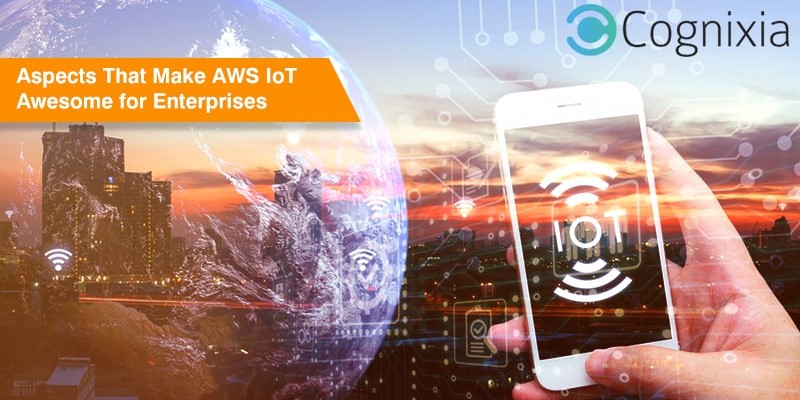
Internet of Things (IoT) enterprises today are constantly looking to leverage the cloud platforms to their benefit. In the abundance of choice, however, it is quite natural to be lost before the IoT journey actually starts. Every platform has its own pros and cons. Your choice must therefore be the one whose pros work effectively for you, and whose cons are either negligible or not applicable in your case. Following are the 5 reasons that make AWS IoT a great choice for enterprise IoT:
-
Security Standards of the Highest Grade
No matter how significant an application is, if it’s not secure, it has no life.
A formidable tech giant like Amazon is going to leave no stone unturned when it comes to securing data, devices, and the network. With multiple authentication, authorization, and encryption levels, data is securely exchanged between the AWS IoT platform and the connected devices. Technologies and methods like SigV4 and X.509 are incorporated in AWS IoT. Amazon’s authentication engine IAM is also integrated in AWS IoT making it a fool-proof cloud platform for IoT devices.
-
Serverless Architecture to Focus Upon Core Tasks
“Deploy more, maintain less” is the modern mantra.
Serverless architecture enables the developers to carry out the core tasks without worrying about scalability and maintenance of the server. Developers write the code and deploy it as small functions. Thus, enterprises have to pay only for these executed functions as per Amazon’s billing model. AWS Lambda is the element behind the serverlessness of the IoT back end. With AWS IoT and AWS Lambda, IoT enterprises can build highly flexible, customizable, and automated back end.
-
Analytics, AI, and Machine Learning
An emerging technology powered by other emerging technologies becomes immensely powerful.
Data analytics in IoT software is in a great demand. Amazon has in place a number of analytics tools for the AWS IoT platform. AWS IoT Analytics and AWS Kinesis Analytics are two of the powerful services that work upon the data received from IoT devices. Both these services also include Machine Learning and AI technologies thus enhancing reporting capabilities and dashboards with specific sets of information. It also leverages data from IoT devices and data from other sources to generate alerts when a specific requirement from the IoT sensors fails or is not met.
-
Partnership with IoT Device Manufacturers
Being limited by hardware compatibility is not at all desirable.
Connected devices get their real strength from the communication and coordination with other connected devices and third-party services. Amazon ensures this with its partnership with various trusted IoT device manufacturers and IoT software providers. This offers enterprises the much needed domain expertise and products ready to be connected to the AWS IoT platform supported by AWS.
-
Wide Range of AWS Products & Services Integration
A top provider of services has a wide range of solutions tailored for major customer categories.
There are about 100 Amazon Web Services out of which AWS IoT platform is one offering which further consists of 8 tools and services for IoT. This means that developers in the AWS IoT platform can interconnect and leverage all the other Amazon Web Services. Some of the major supported services are: Amazon Kinesis, AWS Lambda, Amazon Machine Learning, Amazon CloudWatch, Amazon S3, and more.
Choice of a platform is always a matter of personal experience. AWS offers an impressive infrastructure which enterprises choose for better flexibility in terms of cost and the wide range of options for cloud-based services.
Finally, your choice of a formidable IoT platform like the AWS Internet of Things must be complemented well with professional expertise either from your own workforce, or from hired candidates from external sources. Whatever the case is, AWS IoT training and certification can play a vital role for enterprises to upskill their workforce who will definitely perform better than the rest, giving you the much needed competitive advantage.

